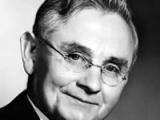What happened that day?
See historic events for any day of the year by entering the date below. Why not try your birthday?
Kiwi of the Week
Today in History

1939 PM declares NZ's support for Britain
When New Zealand declared war on Germany on 3 September the country's Prime Minister, Michael Joseph Savage, was recovering from an operation to treat colon cancer. The acting Prime Minister, Peter Fraser, issued a statement to the public in his place. Two days later Savage addressed the public from his sickbed at his home in Northland, Wellington. The address was broadcast across the national radio network that evening, and was widely reported in newspapers in the days that followed.
In his address Savage argued that New Zealanders had no particular 'hatred of the German people', pointing to his country's ‘admiration and affection' for 'their songs, their poetry and their music'. He acknowledged that 'there are many millions of German people who want to live in peace and quietness as we do, threatening no one and seeking to dominate no one'. But he went on to point out that those in power in Germany ‘despised and rejected' such a way of life.
Savage's address was at once an attack on Nazism and an expression of the country's loyalty to and support for Britain. He highlighted the benefits New Zealand had received from its association with Britain, and argued that New Zealanders, more than anyone else, should see what was at stake if they did not take up arms against Nazism:
I am satisfied that nowhere will the issue be more clearly understood than in New Zealand - where, for almost a century, behind the sure shield of Britain, we have enjoyed and cherished freedom and self-government. Both with gratitude for the past and confidence in the future, we range ourselves without fear beside Britain. Where she goes, we go. Where she stands, we stand. We are only a small and young nation, but we are one and all a band of brothers and we march forward with union of hearts and wills to a common destiny.
At this time the country was unaware just how serious Savage's condition was. He did briefly acknowledge his illness during the address, but then only to point to it as an example of 'how quick to kindness the people of this country can be, and how easily political and other differences are extinguished by sympathy and good will'. He died just over six months later, on 27 March 1940, and was succeeded as Prime Minister by Peter Fraser.
Image: Michael Joseph Savage




















